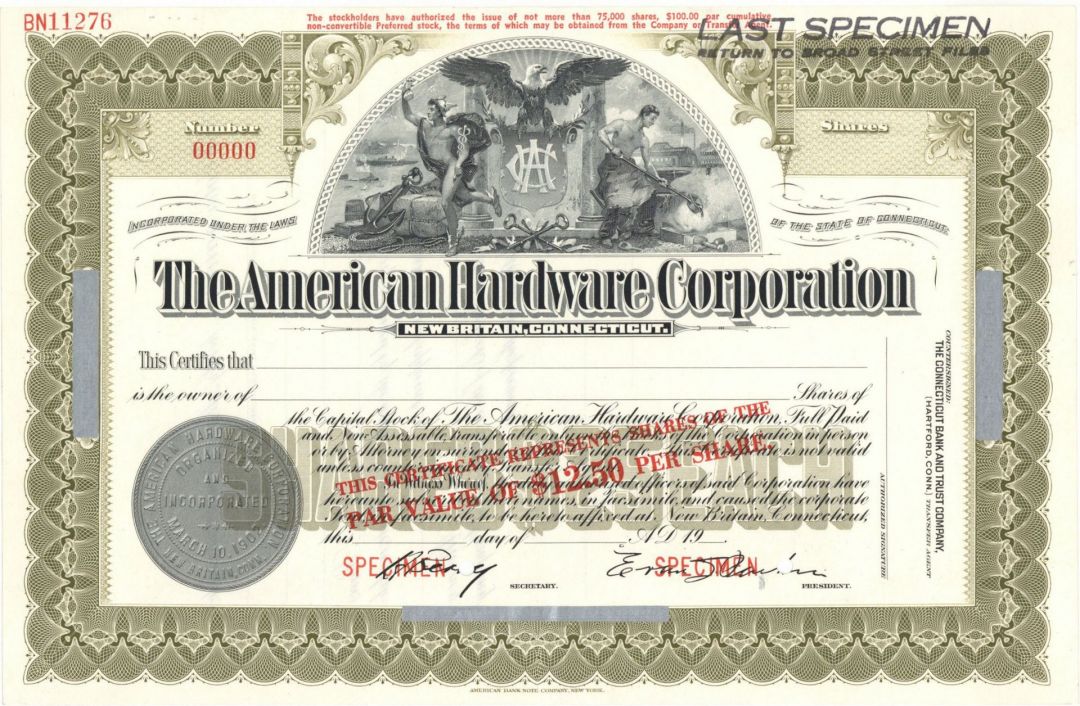American Hardware Corporation - Specimen Stock Certificate
Inv# SE1530 Specimen StockSpecimen Stock printed by American Bank Note Company. Please specify color.
New Britain, Connecticut, established its dominance as the center of American hardware manufacturing as early as the late 1700s. Blacksmith shops provided a multitude of goods, including nails, hinges, locks and keys that were distributed by traveling peddlars to the farms and small towns of early America. By the mid-1800s entrepreneurs formed factories to better produce goods that were in increased demand.
The Russell & Erwin Manufacturing Company originated in 1839 when H.E. Russell, Cornelius B. Erwin, and Frederick T. Stanley formed a partnership to produce locks and builders' hardware, under the name of Stanley, Russell & Company. When Mr. Stanley withdrew from the partnership in 1840, Smith Matteson and John H. Bowen were added, changing the name of the company to Matteson, Russell & Company. In 1846, with the death of Mr. Matteson and the expiration of the partnership terms, the company's name changed to Russell & Erwin. In 1851 the partnership was reorganized as a joint stock company and was from that time known as Russell & Erwin Manufacturing Company, until its merger with P.& F. Corbin in 1902. Cornelius Erwin served as president of the company from 1851 until his death in 1885. The company is best known as the pioneer of the wrought steel lock industry.
P. & F. Corbin originated in 1849 when brothers Philip and Frank Corbin, and Edward Doen established the firm of Doen, Corbin & Co., to manufacture ox balls. The company's name changed to P. & F. Corbin in 1851. In the last half of the 19th century they broadened their products to include coffin trimmings, knobs, and stove handles. In 1868 they began specializing in the manufacture of builder's hardware and locks.
The American Hardware Corporation was formed in 1902 as a holding company through the merger of the Russell & Erwin Manufacturing Company and P. & F. Corbin, which were at that time separate and independent and rivals in the market for builders' hardware. At the time of the merger the two companies produced nearly one-half of the total hardware of this type in the United States. The two merged companies remained as distinct divisions of American Hardware Corporation and two other divisions - Corbin Cabinet Lock Company and the Corbin Screw Corporation - were added later.
Philip Corbin, president of P.& F. Corbin, served as American Hardware Corporation's first president until his death in 1910. Charles M. Jarvis served from 1910 to 1913, succeeded by Henry C.M. Thomson. In 1924 Mr. Thomson was succeeded by George T. Kimball.
Corbin Screw Corporation, a unit of the American Hardware Corporation, was formed in 1903 from the merger of the screw divisions of P. & F. Corbin and Russell & Erwin Manufacturing Company. It specialized in machine and other types of screws, bolts, chains, and escrutcheon pins.
Corbin Cabinet Lock Company was established in 1882 as a unit of P. & F. Corbin and became a division of the American Hardware Corporation in 1905. It produced cabinet hardware, padlocks, trunk locks, mail boxes, post office lock boxes, house letter boxes, straps, and brackets.
During both World Wars the companies manufactured such items as gun parts and hand grenades. In 1950 they employed 4,200 persons and occupied 2,255,912 square feet of floor space in three factories in New Britain.
In 1964 American Hardware was bought out by Emhart Corporation and in 1970 a new plant was built in Berlin. In 1989 Emhart was taken over by Black & Decker. Today, Corbin Russwin Architectural Hardware in Berlin, Connecticut, manufactures padlocks and is owned by a Swiss concern, which also owns Sargent Lock Company in New Haven, Connecticut. (From UCONN.EDU)
Stock and Bond Specimens are made and usually retained by a printer as a record of the contract with a client, generally with manuscript contract notes such as the quantity printed. Specimens are sometimes produced for use by the printing company's sales team as examples of the firms products. These are usually marked "Specimen" and have no serial numbers.












Ebay ID: labarre_galleries